A Lovely Day....and photos photos photos!
Sorry if I seemed so brief in yesterday's entry, but I felt rushed since I didn't know when the wireless would stop working!
Anyway, today we took a rather fun bus tour of London, seeing places such as Oxford St, Picadelly (sp?) Circus, Big Ben,St Paul's Cathedral ("feed the birds") and other lovely landmarks. Like I said before, nothing much seems to have changed in the way London is functioning, other than all the policemen around! I reallllly want to go to see Phantom or Mary Poppins, soI might check into half price tickets.
I took millions of photos from today's tour, but as those deserve an entry for themselves (probably tomorrow), here aresome photos from yesterday and the day before.
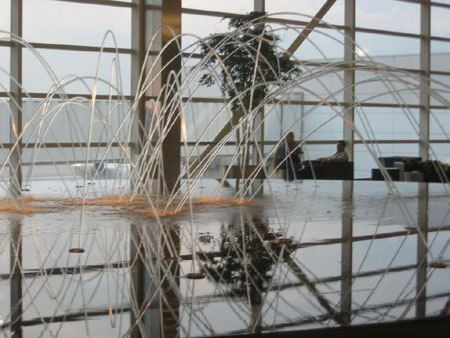
Cool fountain in Detroit airport.
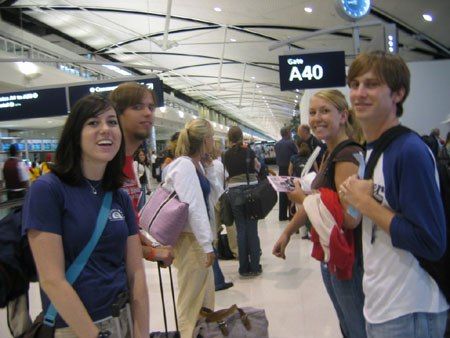
The Dallas Crew! Elizabeth, Brittany, ummm I forgot her name, and Paul.
English village we passed through.
This one is for Katrina....

Thames.
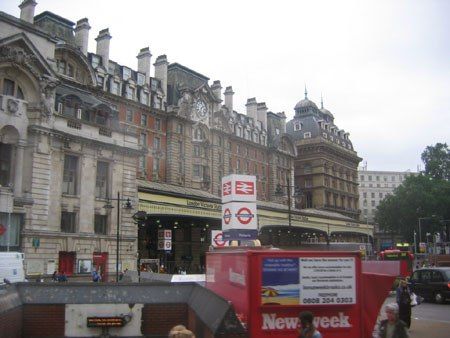
Victoria Underground STation
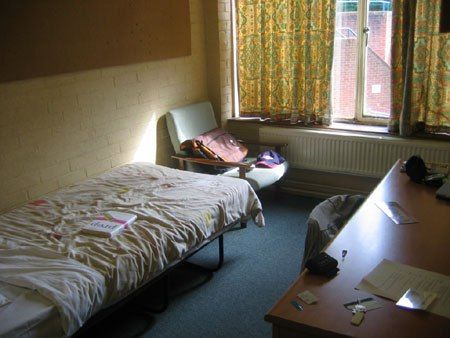
My humble abode.
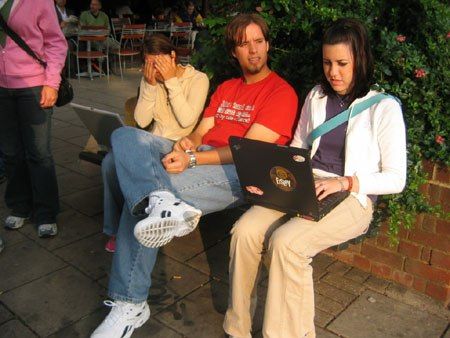
The park bench I'm sitting on!
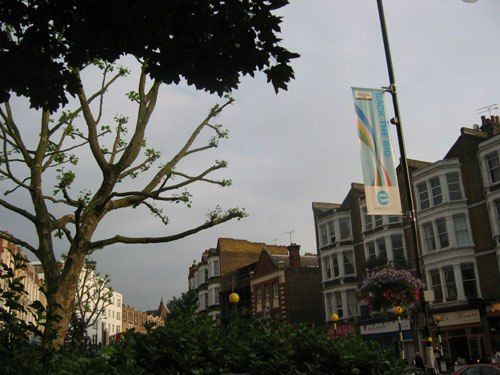
Hampstead.

Elizabeth with the wine she got with the hummas. It was red Australian or something. She liked hers alot, but I probably couldn't even stomach half a glass.

A Yorkie Bar. When I bit into it, it huuuuurt like a "mofo". Geez.
Also, calling home has been way too difficult. I think I got the wrong kind of calling cards, and Cingular hasn't activatedmy international calling yet. Grrr. Thankfully Elizabeth has let me use her cell phone (it gets calls for free), to finallycall home today. If all else fails, I might rent a cell phone....
In other news, the school's breakfast is excellant! I had a croissant with tons of fruit (including clementines!) and it filled meup! Then we had an orientation about the college, etc, (we got our tube passes, finally!), then went on the tour. Liz and Isplit a Kit-Kat bar, and Eileen was right, they're so much better here.
I'll try and get on tomorrow to post those photos. If not, classes start Monday, so perhaps that night I can do a better, moreconcise and cohesive update. If I haven't gone "bonkers" (as our tour guide kept saying) from the strange traffic habits of Londondrivers.
The First Day
Well, it's been a tiring past 24+ hours, but so far, London has been fantastic!
The flight to Detroit wasn't too bad, and the layover in Detroit was fine, since the people who flew out of Dallas were pretty awesome. We had a great time, and only 2 of the other 6 people are from Belmont (that flew from Dallas). The flight to London took FOREVER though, and I only got about an hour of sleep.
So we arrived about 10 AM this morning, and that was followed by a long line at customs with rude British men, then a 2.5 hour bus ride to Hampstead. I finally got some sleep on that.
Once we got settled in our rooms- I have a single- we went on a walking tour of the area, and it's pretty awesome. Then we had some reception thing and ate some food, met some people, got to see friends from Belmont like Tam. And now, Elizabeth Dunn and I are sitting on a bench in Hampstead after having a drink and hummus. The eatery had wi fi for customers but only during a certain time period, but for some reason, the wireless works....
Alright, I imagine I might come back Sunday to upload photos. And to my family, I haven't called because I don't have any change. Tah tah!
The Beginning....
Well, I think it's safe to say this trip has gottan off to an interesting start, and I haven't even left for the airport yet! I had planned on sleeping a little later than usual, but I woke up to my phone going off this morning at 6.25AM (CST). The phone brought news of the London Tube/Bus bombings. Needless to say, it was quite shocking to see that happening in the city I'm going to be at in less than 24 hours!
However, as CCSA hasn't said otherwise, I am still going to London, and it seems that my flights will be on schedule! To the many people who called and texted me, Thank you very much for your concern! I really appreciate it.
Anyway, I'm pretty much all packed, save my carry-on bag...but that's because this laptop is going in that. Hehe, can't go without that!

It's weird that my entire life for a month is packed up in those two bags. And they're not bulging with clothes either!
This is so typically something a girl would do, but I had to plan my "outfit".....I think my Audio Adrenaline Worldwide shirt is appropriate, wouldn't you say? The whole "New York, Paris, London, Tokoyo" thing going on....after this month, I'll just need to visit the last one for my shirt to truly an "expression" of myself. Har har.

So my plane from Dallas leaves at 3.46 PM. I fly to Detroit, and then my plane to Gatwick leaves about 9.40 PM, arriving in London Gatwick around 10.00AM their time. Since I'm not sure when I can get on the internet next (I hear there's plenty of cafes over there), here's what I'll be doing the first few days:
Friday 8 July: Arrive in London
Check-in
Walking Tours
Reception
Saturday 9 July: Breakfast
Orientation mandatory for students & faculty
London City Tour
And then class starts Monday. Fun times. To family, I'll call Friday evening or perhaps Saturday, if I'm too tired. Goodbye for now!
-Marion
Position Paper #4
Give a brief summary of the primary issues that have come up with EU social integration, particularly regarding religious (especially Muslim) and racial tensions and then address the following questions:
-What kind of issues has your country encountered with religious integration?
-Has your country experienced any specific tensions with a Muslim community?
-In addition to religious differences, what other social tensions are prevalent in your country—racial or ethnic tensions, issues of sexual orientation, and so on?
-What is your country’s immigration laws?
One of the main purposes of the European Union is to allow EU nationals to travel through the member countries without the hassle of borderline security. Obviously, with this inter-state freedom comes the question concerning immigration: How will the EU handle the new scores of citizens as enlargement continues to include countries such as Turkey, a non-white and non-Christian nation? This question will need to be answered in the near future, as enlargement plans continue forward. However, as this expansion grows further east, specific issues involving how the new member countries will adapt to the EU’s human rights policy may arise. For example, Turkey, a primarily Muslim country, does not hold women in the same regard as the more secular France. This concept of the absolute equality of men and women- as stated in the treaty of Rome, “Article 114 (119) enshrines the principle that men and women should receive equal pay for equal work”- is not a foundation of Islam. Despite the fact that, according to the EU’s website, “the Turkish constitution recognises gender equality,” a “serious effort” is needed to ensure implementation of equal treatment of both genders. Until the EU sees a significant improvement in the Turkish culture, or for any other potential member state, the ascension talks may slow down.
However, the European Roma Rights Centre (a public interest group) points out that the EU’s policy “does not cover difference of treatment based on nationality and is without prejudice to provisions… relating to the entry into and residence of third-country nationals and stateless persons on the territory of Member States, and to any treatment which arises from the legal status of the third-country nationals and stateless persons concerned." It is unclear whether or not this lack of protection has escalated the tension between aliens and EU citizens.
That said, domestic policy concerning religious integration certainly has caused brouhaha in countries such as France, where laws regulating the expression of religion exist. Indeed, the French law stating that those attending public schools may not wear symbols of their faith spawned a bitter debate over the extent of France’s prided secularism. According to a BBC News article, “The ban is designed to maintain France's tradition of strictly separating state and religion. It forbids state school students from wearing ‘conspicuous’ religious apparel. Jewish skullcaps, Sikh turbans and large Christian crosses are also banned.” Not surprisingly, the ban led to many upset Muslim students, particularly females, who were expelled due to their non-compliance with the ban, raising the Muslim community’s fears that France was targeting their religion in order to alleviate “French fears of an increasingly fundamentalist form of Islam being practised by a younger generation of French Muslims.” But the supporters of the law claimed that it helps unite France by maintaining her strength, similar to when she had to stand up against the “divine-right monarchists” centuries ago.
Though France holds the largest Muslim minority in Europe, many Muslims feel that they must work diligently to make Islam a “valued” part of the country. One example of this diligence is through existence of the French Council of the Muslim Faith, an elected body that calls itself the voice of the five million French Muslims, as stated in a BBC News article. As a result of the large populations of Moroccan and Algerian immigrants, several divisions within the Muslim communities have developed- hence the council to unite this diverse religious group full of moderates, conservatives, and liberals. However, one problem French Muslims have involves France’s attitude towards the potential inclusion of Turkey in the EU- a negative one that may be interpreted as anti-Islamic. As mentioned earlier, Turkey holds a mostly non-white, non-Christian population, not exactly fitting the classical “European” profile. Perhaps this fact- the diminishing of the “old” Europe- may contribute to the French’s purported hostility towards Muslims. “The French voters' reported hostility to Turkish membership probably has less to do with Islam and more to do with a general annoyance that Europe scarcely looks like Europe any more,” so claims the BBC. But until the French government clarifies what it fears more- Muslims or the loss of their familiar Europe- the 5 million French Muslims may feel ostracized to the point of dramatic repercussions.
While in the immediate post-World War II decades France had a high immigration rate, in recent years the rate has decreased due to many factors listed in an essay analyzing France’s immigration policy; Virginie Guiraudon (of the National Center for Scientific Research) attributes this decline to, “socioeconomic restructuring and economic downturns since the 1970s...[resulting in] French employers…not need[ing] (legal) foreign labor.” Additionally, the basic structure of the French immigration system is presented:
“France has nonetheless continued to receive legal immigrants, with approximately 100,000 new entries per year. The legal flows have included EU migrants who enjoy free movement rights, family members of legal residents, whose rights are protected by domestic law, and refugees and asylum-seekers admitted on the basis of constitutional and international law. These are mainly unsolicited migrants, those whose rights of entry and stay are guaranteed by constitutional norms and international agreements. France's Conseil d'Etat, its highest administrative court, has since the late 1970s played a key role in defending these groups. As successive governments have sought to stem migration flows and to issue more expulsion orders, France's high courts have entered the fray of immigration politics. Legal aid groups such as the ‘Group to Inform and Support Immigrant Workers’ have helped the courts in this effort. Together, the courts and the Conseil d'Etat have greatly limited state discretion in the area of migration control.”
French businesses are also trying to adjust to the flux of immigrants by trying to diversify their employees, due to the growing concern over discrimination towards blacks, Arabs, and Asians, according to L'Observatoire des Inegalites, an independent research group. Even an official section of the government was formed recently to battle discrimination in the workplace and the social life. A BBC News article recently highlighted this effort by the French, but also noted the long road ahead. As the article quotes Pascal Bernard (a human resources manager), "If we don't want a social bomb to go off in our face, we have to open our doors now to all differences!" Unfortunately, there still remain social bombs in France that do not necessarily involve race.
Another growing minority inside of France is the homosexual community. Though this group has not appeared in the headlines as much as the Muslims, as more countries in Europe allow the legalization of gay marriages, the issue inevitably will appear in French headlines as more governments take a stand. Last year, one of France’s mayors defied national law and performed the first gay marriage ceremony inside the country, resulting in Justice Minister Dominique Perben declaring it “invalid”, leading to the courts system defining marriage as requiring “a difference of sex.” That said, in 1999, France added a civil contract called the Pacs, which “gives some rights to cohabiting couples, regardless of their sex,” but “does not give the full rights of marriage, notable over taxes, inheritance and adoption.” As with the United States, the growing support of same-sex marriages may result in a change in law for the French, as their demographics change with time.
Sources:
BBC News: France and the EU Constitution.
BBC News: French firms aim for racial integration.
BBC News: French girls expelled over veils.
BBC News: French scarf ban comes into force.
BBC News: Gay marriage around the globe.
BBC News: Moderates win French Muslim Poll.
BBC News: The deep roots of French secularism.
European Parliament Facts Sheet- 4.8.7 Equality for Men and Women.
European Roma Rights Centre.
Immigration Policy in France.
SCADPLUS: Turkey.













